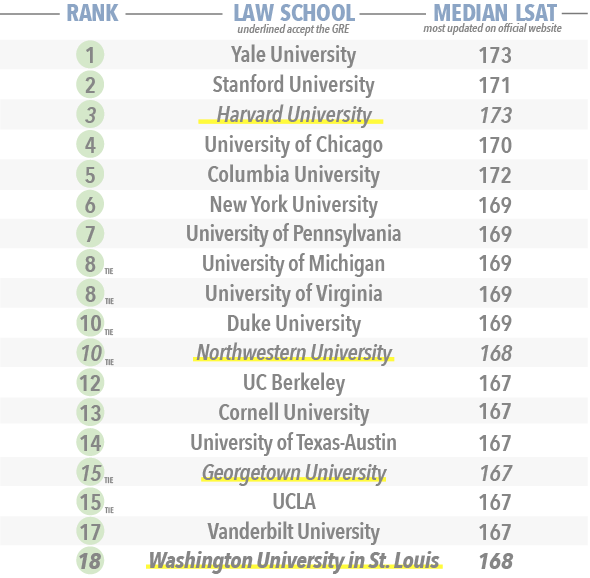Academics | News
School of Law to accept GRE
University becomes sixth in nation to accept alternative entrance exam beginning with applicants for Fall 2018
The Washington University School of Law will begin accepting the Graduate Record Examination as an alternative to the Law School Admission Test from applicants to the Fall 2018 J.D. program, becoming the sixth law school in the country to do so.
The School of Law hopes to allow more students to the possibility to apply by accepting the Graduate Record Examination (GRE), which is taken for entrance to many graduate programs, as an alternative to the Law School Admission Test (LSAT), which specifically tests for preparedness for law school.
 Graphic by Noa Yadidi
Graphic by Noa Yadidi SOURCE: U.S. News & World Report // Official University websites
While the LSAT is the traditional entrance exam for law school, the GRE is offered more frequently and typically costs money for students to prep for. For both of these reasons, the School of Law hopes that the GRE can provide more students, including those who may be struggling to decide between law school and graduate school, the chance to apply.
According to Mary Ann Clifford, the law school’s assistant dean of admissions, the school made the decision after studying the predictive ability of both exams.
“Washington University Law School conducted a study based on students that had taken both [the] LSAT and GRE to see if [the GRE] could potentially be used as a predictor of success in law school. The results came back that it could be,” Clifford said.
Five other law schools—Harvard University, Georgetown University, Northwestern University, the University of Arizona and the University of Hawaii—also accept the GRE.
“Many law schools have struggled to maintain the volume of applicants and their high academic standards of admissions because they’ve had fewer applicants to select from [recently],” Executive Director of Pre-Law Programs for Kaplan Test Prep Jeff Thomas said. “Law schools have been trying for years to figure out ways to change the value proposition for why getting a legal education is a great thing and to make the [cost] of applying to law school a little bit less burdensome for those applicants. By accepting the GRE, it allows law schools to extend the reach of potential applicants.”
According to senior Lance Peterzell, president of the Washington University chapter of pre-law fraternity Phi Delta Phi, this shift to accepting the GRE may help pre-law students at the University.
“I think it’s definitely a positive change as far as helping the student body. There’s definitely a decent amount of the population that is interested in possibly choosing between grad school and law school,” Peterzell said. “If this represents a shift for the larger law school community as a whole, for more law schools to start accepting the GRE, I think that could really be useful for a lot of students.”
Although select law schools are starting to accept the GRE, the most common advice for pre-law students remains to continue preparing for the LSAT, since the majority of law schools currently only accept the LSAT.
“The GRE might be the track of option for those on the fence students, but for students that really know law school is in their future, the LSAT is still the test they need to take,” Thomas said.
